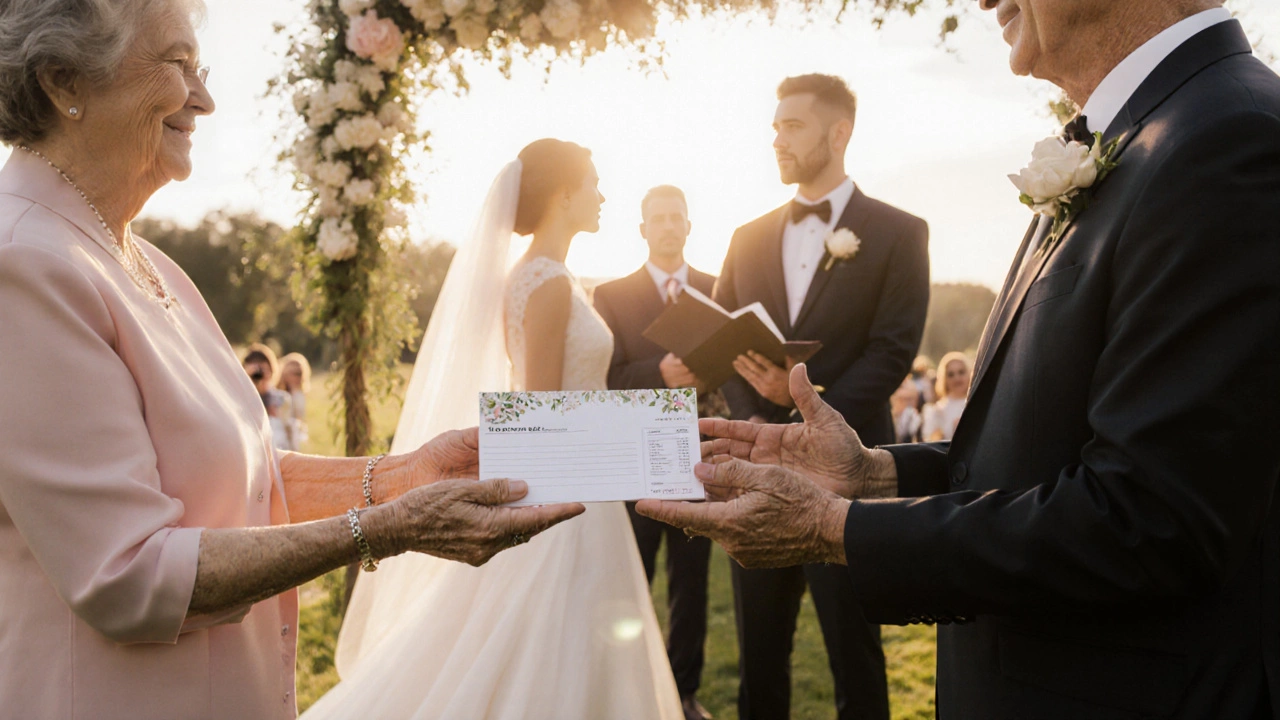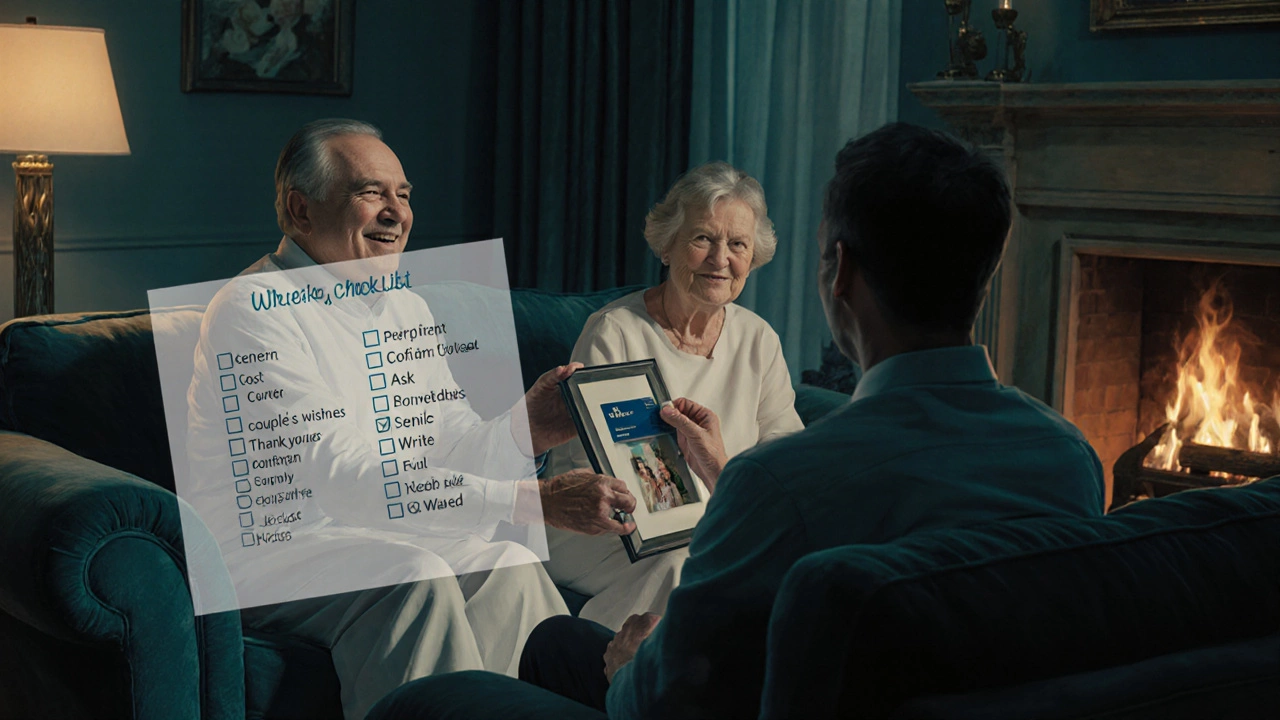Should Parents Give a Wedding Gift When They Paid for the Wedding? Etiquette Explained
 Oct, 8 2025
Oct, 8 2025
When a couple’s parents foot the bill for the ceremony, the question of whether they should also send a wedding gift pops up fast. It feels a bit odd-after all, they’ve already spent thousands on the venue, catering, and décor. Yet the tradition of giving a gift is rooted in gratitude, not just money. Below you’ll find the etiquette rule‑book, practical ideas, and a quick checklist to help everyone sleep a little easier.
Key Takeaways
- Parents are not obligated to give a separate gift if they fully covered the wedding costs.
- A small token, a heartfelt thank‑you note, or a charitable donation often feels just right.
- Consider the size of the contribution, cultural expectations, and the couple’s wishes.
- When a gift is given, match its value to the level of financial involvement.
- Clear communication before the big day prevents awkward assumptions.
Now let’s unpack the why and how of this delicate situation.
Do parents need to give a gift?
Parents are the people who traditionally support the wedding financially or emotionally, and their role often blurs the line between giver and receiver. In most Western cultures, including Australia, the primary purpose of a wedding gift is to help the newlyweds start their life together. If the parents have already shouldered the biggest expenses, they are effectively fulfilling that purpose.
Etiquette experts such as Leigh Carter of the Australian Wedding Guide point out that a separate gift becomes optional rather than expected. The rule‑of‑thumb: the more a parent contributes to the overall cost, the less pressure there is to present an additional present.
Factors that influence the decision
- Scale of financial contribution: If the parents covered 100% of the venue, catering, and photography, a modest gesture is sufficient. If they merely assisted with a few line items, a regular wedding gift may feel appropriate.
- Cultural expectations: Some families follow strong traditions where giving a gift is non‑negotiable, regardless of who paid. In multicultural Australia, you’ll hear variations from Asian, Mediterranean, and Indigenous customs.
- Relationship dynamics: Close‑knit families might love a sentimental keepsake, while more formal families may prefer a cash contribution that can be added to the couple’s honeymoon fund.
Common gift options for parents who paid
When parents decide to give something extra, the idea is to keep it light yet meaningful. Below is a quick look at popular choices.
| Gift Type | Typical Value (AUD) | Why it works |
|---|---|---|
| Hand‑written thank‑you note + small token | $50‑$100 | Shows personal appreciation without feeling like a second wedding expense |
| Cash contribution to honeymoon fund | $200‑$500 | Lets the couple allocate money where they need it most |
| Charitable donation in the couple’s name | $100‑$300 | Reflects shared values and can be less awkward |
| Experience gift (cooking class, wine tour) | $150‑$400 | Creates a memory that lives beyond the wedding day |

Pros and cons of giving a separate gift
Pros include reinforcing gratitude, strengthening family bonds, and giving the couple a small financial boost. Cons can be the perception of double‑dipping, especially if the couple already feels the parents have spent a fortune.
How to choose the right amount or type
- Ask the couple discreetly if they expect anything beyond the wedding itself. Many couples are happy to say “no, thank you.”
- Base the gift’s value on roughly 5‑10% of what you paid. For a $40,000 wedding, a $2,000‑$4,000 contribution would be generous, but a $200‑$500 token is usually enough to convey appreciation.
- Consider non‑monetary gifts-personalized photo albums, family heirlooms, or a weekend getaway that the couple can enjoy after the honeymoon.
Thank‑you notes and expressing gratitude
Regardless of whether a separate gift is given, a heartfelt thank‑you note is non‑negotiable. Thank you notes should mention the specific way the parents helped-whether they covered the venue, handled the catering, or simply gave moral support. A good template:
"Dear Mom and Dad, thank you for making our wedding day unforgettable and for the beautiful coffee table book you gifted us. Your generosity means the world to us. We can’t wait to share many more memories together. With love, [Names]"
Personal touches, like a photo from the ceremony, make the note feel genuine.

Real‑world examples
Emma and Liam (Melbourne, 2024) received a $40,000 wedding bill fully paid by Emma’s parents. They sent a handwritten note and a $250 contribution to the couple’s Sydney‑based honeymoon fund. The gesture was praised for its thoughtfulness without adding financial strain.
Another case: Carlos and Aisha (Sydney, 2023) had a modest $15,000 ceremony. Carlos’s parents, who helped with the venue but not the entire cost, opted for a $500 gift card to a home‑goods store plus a framed photo of the wedding day. Their choice was viewed as a perfect balance of gratitude and practicality.
Quick checklist for parents
- Confirm the total wedding cost you covered.
- Ask the couple (or a trusted intermediary) if they expect an extra gift.
- Select a gift type that matches your contribution level.
- Write a sincere thank‑you note that references the wedding help.
- Deliver the note and any gift before the honeymoon, or within two weeks after the wedding.
Frequently Asked Questions
Is it rude for parents to give a wedding gift if they paid for everything?
Not at all. Etiquette views a gift as optional in this scenario. A small token or heartfelt note is usually enough to show appreciation.
What amount is considered appropriate for a gift after paying the wedding?
A good rule is 5‑10% of the total cost you covered, but many families opt for a $200‑$500 token, especially if they’re already contributing significantly.
Can a charitable donation count as the wedding gift?
Yes. If the couple has a cause they care about, donating in their name is a thoughtful, modern alternative that avoids the perception of double‑paying.
Should parents discuss their plans with the couple before the wedding?
A discreet conversation (or using a wedding planner as a go‑between) helps set expectations and prevents awkwardness on the day.
Is a thank‑you note still necessary if no extra gift is given?
Absolutely. A sincere note acknowledges the parents’ generosity and reinforces family bonds, regardless of a physical gift.